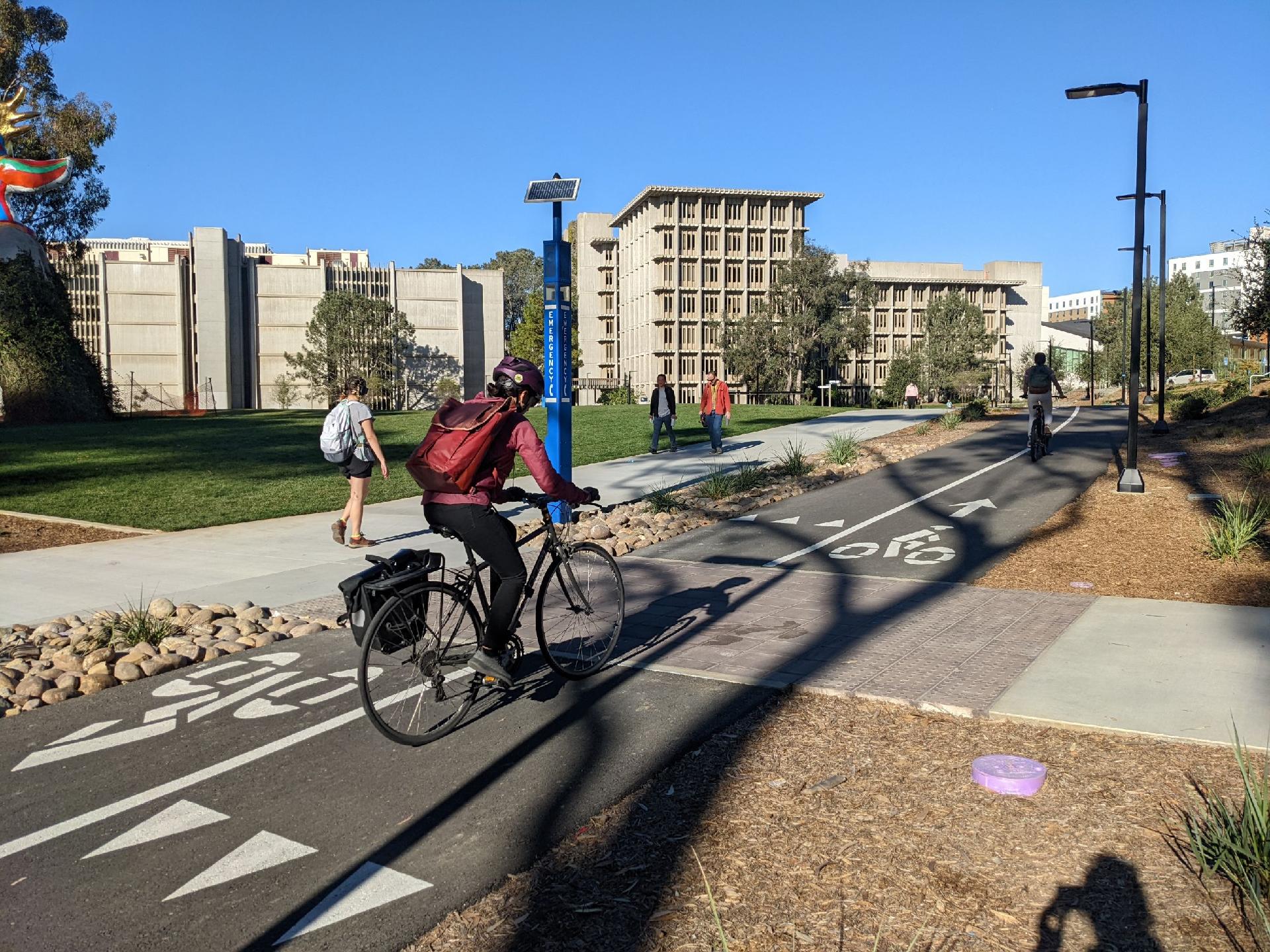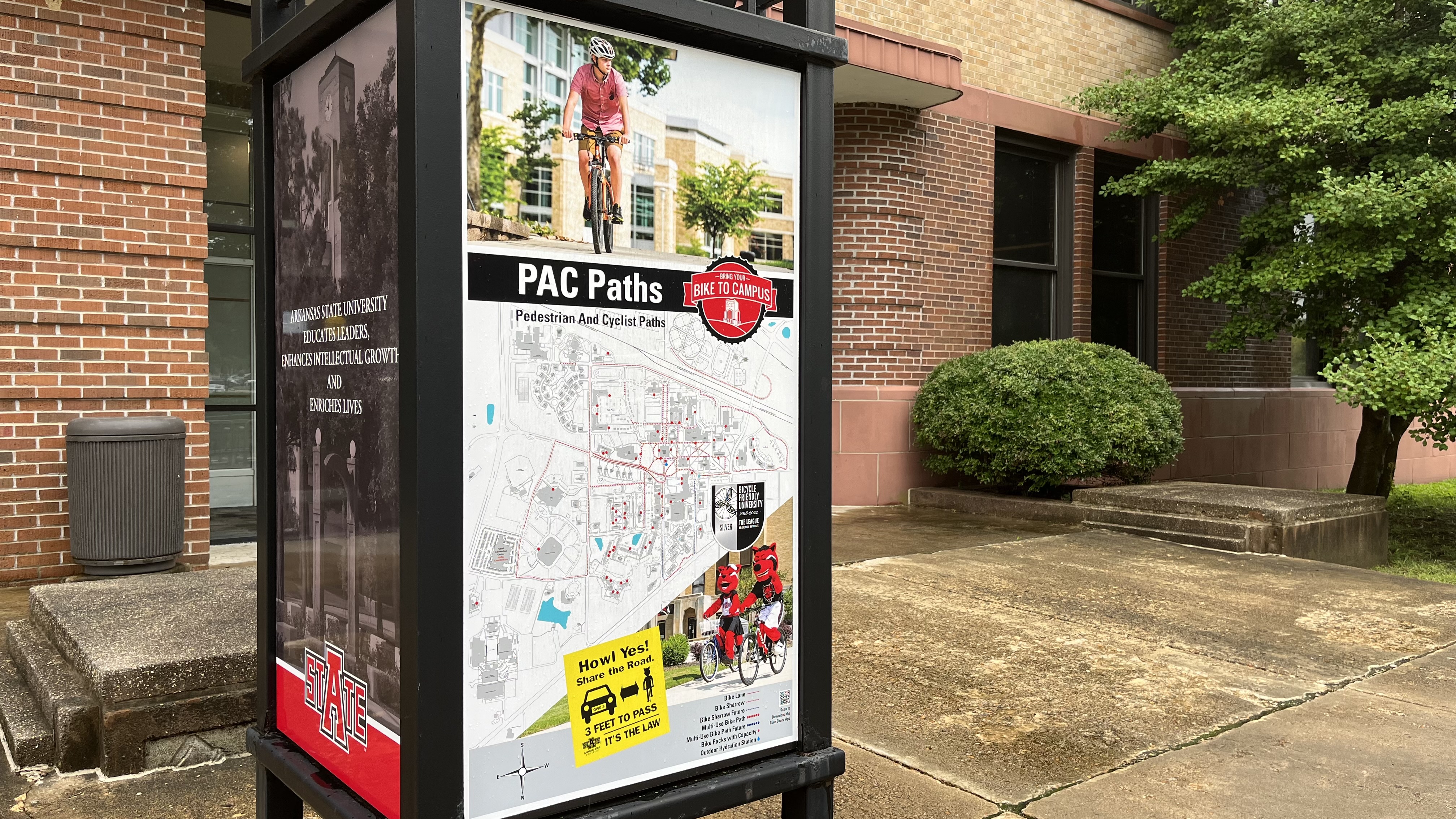DISCOVER YOUR LOCAL BICYCLING COMMUNITY
Find local advocacy groups, bike shops, instructors, clubs, classes and more!
37 Schools Recognized As Bicycle Friendly Universities
WASHINGTON, DC — Today, the League is proud to honor 37 institutes of higher education in its 2022 round of Bicycle Friendly University (BFU) awards, with an additional two institutions earning Honorable Mentions. These 37 new and renewing awardees join a total of 221 colleges and universities across America working with the League and local advocates to build safer streets and better bicycling for everyone.
“Congratulations to our new and renewing Bicycle Friendly Universities, whose efforts show our mission to build a Bicycle Friendly America, one where every person can safely and easily choose to bike, is rooted in every part of a community,” said Bill Nesper, executive director of the League of American Bicyclists. “The 2022 cohort of BFUs, featuring colleges and universities of every size, joins a movement of communities and businesses investing resources in making bicycling safer and easier not only on campus but in their surrounding communities as well.”
 |
|
UC San Diego’s Ridegwalk bike/ped pathway |
Among the 37 awardees this round, four institutions climbed the ranks from previous Honorable Mentions or no designations to earn their first BFU awards: City Colleges of Chicago, Indiana University Purdue University-Indianapolis (IUPUI), University of Massachusetts Amherst and University of Tennessee, Knoxville. Of the 15 Silver-level awards in this round, two BFUs moved up from bronze awards: University of California at San Diego and University of Cincinnati.
Campuses that earn the higher BFU award levels offer well-connected bike networks with infrastructure for people of all ages and abilities and often work in tandem with local advocates, local businesses, city officials, and the League itself in order to provide a safer, better biking experience on and off campus.
A renewing Silver-level BFU, Arkansas State University (A-State) in Jonesboro, Arkansas, is a model for engineering better on and off-campus bike infrastructure through regional coordination. The university partnered with the City of Jonesboro on the city’s 2019 Bicycle Master Plan and members of the A-State Bicycle Committee worked with the regional Metropolitan Planning Organization on its Active Transportation Plan, which earned national honors in 2018.
 |
|
One of five on-campus kiosks mapping A-State’s Pedestrian and Cyclist Paths (PAC Paths) |
“A-State’s standing as a BFU is crucial to our influence on the community,” said Bill Smith, chief communications officer for Arkansas State University and member of the A-State Bike Program Committee. “Our investment into separated infrastructure has motivated our city to commit funding and grants toward building a connection from downtown to campus, and to construct it to the same standards we have used on campus. This is a significant change in city behavior, thanks in part to our status as a BFU, and it legitimizes our voice in the local debate on standards for better places to ride.”
Developing well-connected bike networks with separated and multi-use pathways – the pinnacle of building safer streets for all – is no easy task, especially for colleges and universities located in car-centric cities and towns. That’s why the BFU program also recognizes schools focusing on adding safety improvements to existing infrastructure and areas with high car traffic volumes that deter car-free travel paired with hosting bike education and encouragement programs to ensure students, faculty, staff and visitors are aware of how to safely and confidently make their way to, from and around campus by bike.
The University of North Carolina at Chapel Hill, which also renewed its Silver status in this round, worked with city officials to implement additional Leading Pedestrian Intervals (LPIs) across the Chapel Hill community. LPIs give bicyclists and pedestrians the opportunity to enter the crosswalk at an intersection three to seven seconds before motor vehicles are given a green light. The university also worked with the city to add ‘No Right on Red’ policies, which can further reduce right-hook turning conflicts – one of the most common types of crashes that occur between drivers and bicyclists.
University of Utah, which renewed its Gold-level honor this award round, along with Dickinson College, University of Maryland College Park and University of Vermont, has displayed a long-term commitment to dedicating safe spaces on campus for those traveling outside of cars.
“University of Utah supports eight miles of signed bikeways and multi-use paths, with the majority of campus interior pathways shared by pedestrians, bicyclists and skateboarders,” said Ginger Cannon, active transportation manager at the University of Utah. “Commuter survey data shows almost 90% of the campus population walks or bikes on campus every day and reflects our commitment to active transportation as the preferred way to move through campus.”
If your university would like to join the League’s growing movement to build safe streets for all and a Bicycle Friendly America for everyone, submissions for the 2023 round of the Bicycle Friendly University program are due on August 10, 2023 at 11:59 PM PT.
About the Bicycle Friendly University℠ Program
Bicycle Friendly University awards reflect local leaders’ ongoing work to build better places to bike and evaluate those efforts as part of a national movement. Each of the five levels of the Bicycle Friendly University award – diamond, platinum, gold, silver, and bronze, plus an honorable mention category – provide a clear path for businesses to continuously improve. Visit bikeleague.org/university to learn more about the BFU program.
About the League Of American Bicyclists
Since 1880, the League of American Bicyclists has been people-powered, with a goal to make bicycling safer and easier as a means of transportation and recreation. Today, the League continues to improve lives and strengthen communities through bicycling. We are more than 200,0000 members and supporters strong with more than 1,000 state and local advocacy groups and bike clubs as well as thousands of businesses, universities, and communities together leading the movement to create a Bicycle Friendly America for everyone.